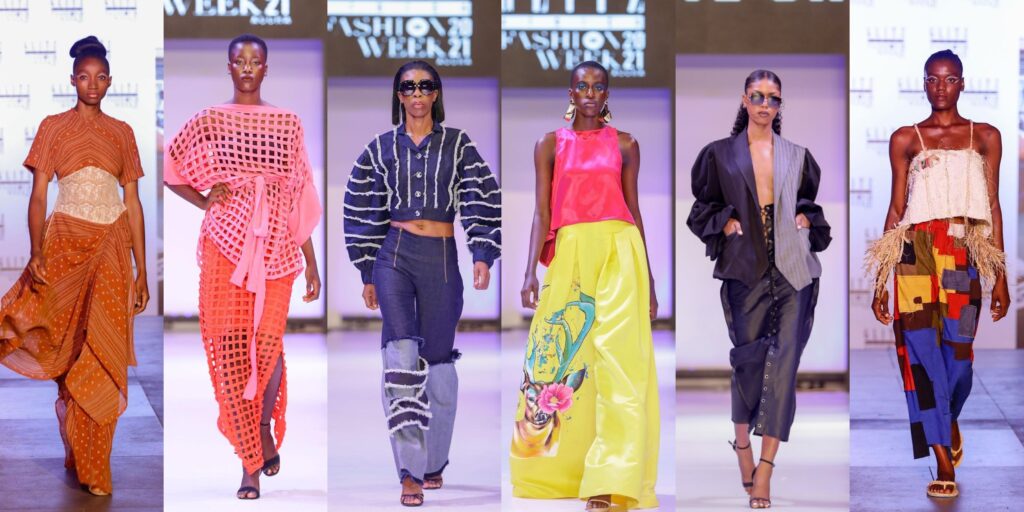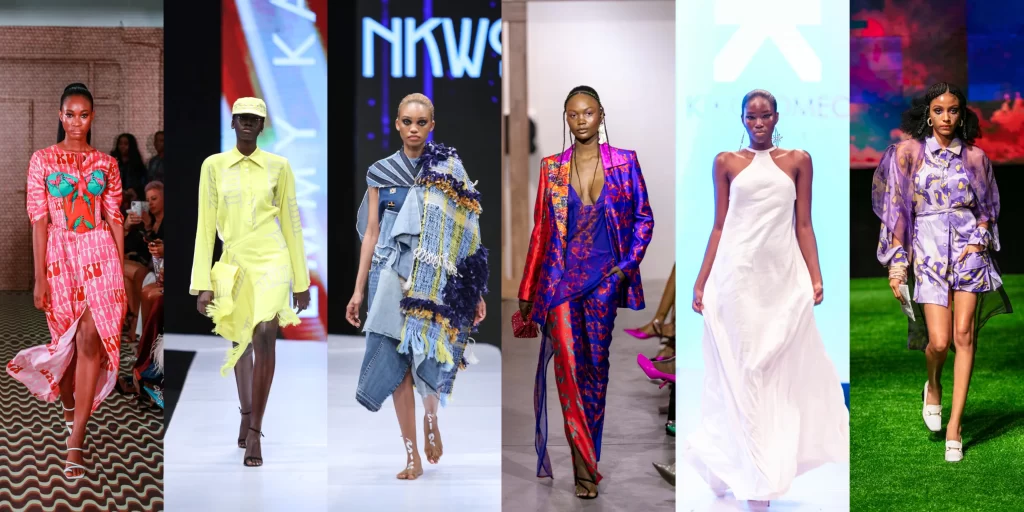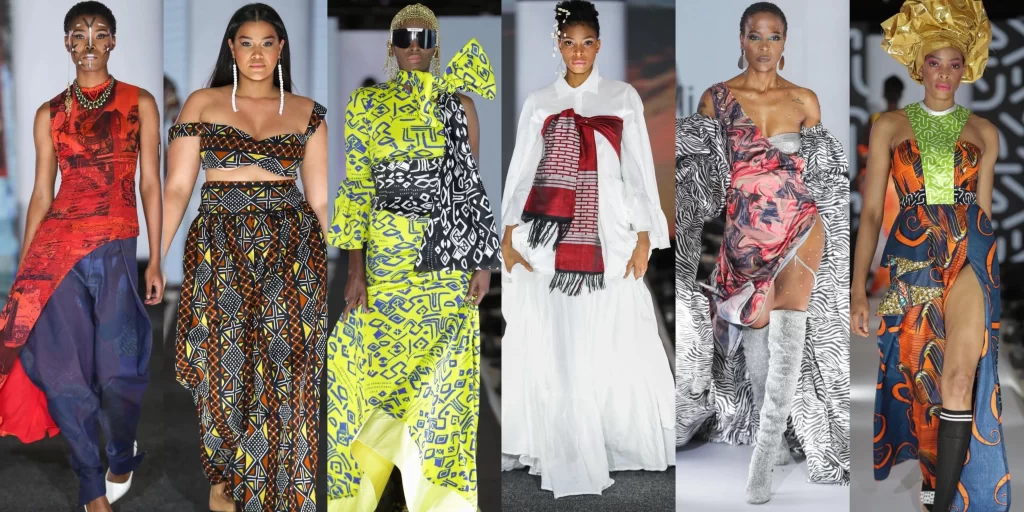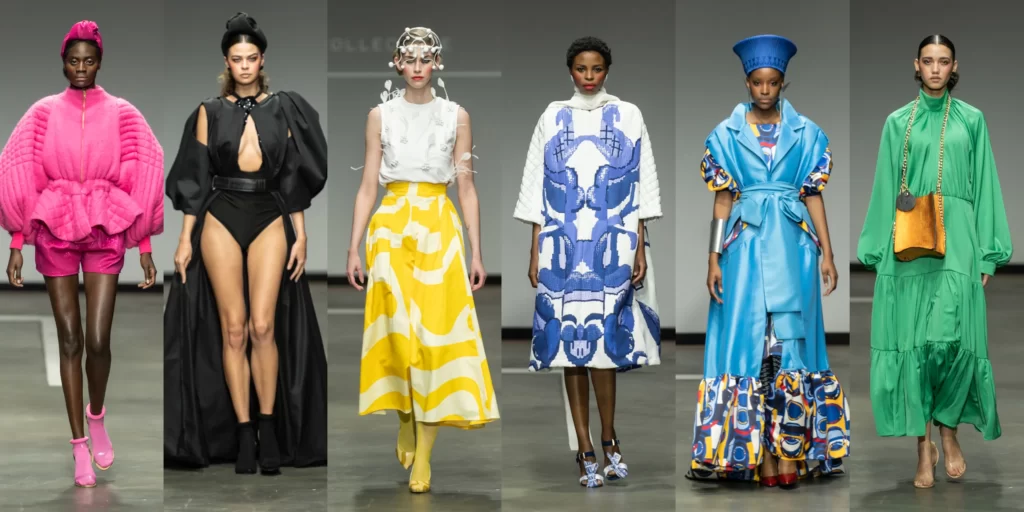From Glitz Africa to AFI, this year’s SS‘22 presentations proved why Fashion Week in Africa still matters, as local designers turned the dial up on cutting-edge design.
After a year of social-distanced showings and live-streamed events, African Fashion Month made its welcome return this October. Comprising Glitz Africa Fashion Week, Lagos Fashion Week, AFI (African Fashion International) Fashion Week, and South African Fashion Week, it’s a thrilling time, one that sees creatives, style enthusiasts, and industry leaders descending upon some of the continent’s major cities to celebrate regional design talent. And though it was only last year that Vogue Business pondered whether traditional runway shows in Africa still have value—or if they ever did—this season’s outstanding turnouts and the designers’ diverse and cohesive collections proved otherwise, exhibiting the immense value of African Fashion Month and the potential it has for promotion, connection, and creation.
Missed the shows? Not to worry, we’ve got you covered. Read on to find out more about the event’s standout collections and key looks, and discover the designers to know.
GLITZ AFRICA FASHION WEEK
Now in its 9th edition, Glitz Africa Fashion Week kicked off African Fashion Month in remarkable style, the still fledgling event proving its might with a lineup of stellar design talent that included Studio 189, Atto Tetteh, Ajabeng, and more. As expected, the former delivered a new range filled with warm, primary colors—their signature spirited style. Though there were a few inventive silhouettes this time around—including a fitted, indigo-dyed cloth maxi skirt and Kente cloth trench coat—their print offering remained as vibrant as ever with colors and patterns styled to clash for maximum impact. Studio 189’s intermingling of prints, wovens, and patchworks was particularly interesting, while it was all about flamboyance for Ghana’s Atto Tetteh. His offering reaffirmed the brand’s focus on reinventing traditional African patterns for the modern man, reflecting a penchant for solid colors, abstract art, and other striking elements that reference the designer’s West African heritage. For Tetteh, his creative pursuit seems an ideal blend between practicality, comfort, and vivacity, and it’s a balance that he may have well achieved. The collection’s mixture of minimalist separates and eveningwear in busy prints proves an irresistible take on the classics. Meanwhile, emerging brand Ajabeng showcased a somewhat restrained design philosophy, with designer Travis Obeng Casper’s largely neutral-toned and uncomplicated collection of everyday staples signifying a return to basics.

LAGOS FASHION WEEK
At Lagos Fashion Week, the runways were awash with kaleidoscopic color, saturated shades of all kinds emerging as a thread of connection between the sterling lineup of designers’ collections. However, striking sartorial details set them apart, like cheeky cutouts, hand-batik dyeing, sculptural shapes, and sharp tailoring. Showcasing a diverse new offering conceptualized as a metaphorical safe space for exploring the pain that comes from prejudicial stereotypes, Orange Culture’s “Peacock Riot” collection certainly lived up to its name. The brand’s lively display of ready-to-wear separates—including peacock-printed leggings, floral tunics, and audacious crop tops—expressed a similar extravagant display of beauty as that of the glorious bird. Day 2 of Lagos Fashion Week saw KikoRomeo debut its “Akili Ni Mali” collection, the collection’s sumptuous tropical tones and painted etchings of flowers evoking the effervescent spirit of the Tanzanian city in which it is produced, Dar es Salaam. Designed by Iona McCreath, the Kenyan brand’s presentation revealed full skirts and flowing dresses that draped gracefully along the body. Still, it was a floral, long-sleeved, full-length dress that stole the show with its bright tones of orange and pink and almost regal air. Next, waste warriors, NKWO unveiled their new range of patchworked pieces, their woven shawls, layered knits, tie-dyed dresses, and denim corsets (styles which currently Gen Z can’t seem to get enough, and which the Nigerian brand has been designing for years) crafted from upcycled materials. On the other hand, Emmy Kasbit’s approach was decidedly more pared-back and slightly casual: his use of color was far softer than we are accustomed to seeing from the brand, each look simple and versatile enough to function for workwear, everyday dressing, and lounging.

AFI FASHION WEEK
Hosted at Johannesburg’s Leonardo Hotel, this year’s edition of AFI Fashion Week was an innovative and jubilant affair, the theme of which was, “Be You, Be Truly African!” Designers openly embraced the concept, showcasing work that embraced contemporary trends but was visibly rooted in African culture. Take, for example, South African brand Lufi D; though their collection of cocktail dresses and eveningwear reflected the sleek and whimsical forms currently in vogue, the prominence of Ankara cloth suggested an unbreakable allegiance to their heritage. Bold patterns also led AMEN Fashion’s latest offering as models strode down the runway in cropped jackets, full skirts, and asymmetrical shirts cut from their signature graphic prints. Senegalese collective Sisters of Afrika bathed the runway in light, warmth, and summer fun, serving up a selection of tie-dyed kaftans and laid-back shirt dresses in billowing, island-appropriate silhouettes. As for veteran South African designer David Tlale, his collection was a luxe take on athleisure and evening wear filled with riotous color, while the intricate layering he employed lent his creations a hefty amount of volume and movement. An exercise in exaggerated femininity, ruffles, brocade detailing, and touches of raffia emerged as crucial details of his collection, the combination of these graceful elements transmuting a spirit of sophistication that it readily imparts to its wearer.

SOUTH AFRICAN FASHION WEEK
Showcasing the collections of both emerging and established designers, SA Fashion Week SS‘22 lit up Johannesburg’s Mall of Africa this past weekend before an audience salivating for a little in-person fashion action. And while the sparse, warehouse-like location of the runway may have appeared austere, this minimalist setting proved the perfect backdrop for the vibrant collections of designers to pop, each of whom seemed to rally around the concept of versatility this season. For fans of South African brand Rubicon, all the original opulent and timeless hallmarks of the brand were visible—the flattering fits, the streamlined silhouettes, the delicate touches of fringing, and the unmistakable spirit of refinement. Meanwhile, Erre wholeheartedly embraced femininity and romance, finding a kind of quiet strength not only through voluminous sleeves, A-Line skirts, and glamorous, floor-skimming capes but also in wide-legged trousers and fitted blazers. Local brand Ezokhetho’s collection was a young and fresh take on the classics, featuring shirt dresses and ruffled frocks decorated with an abstract print in rich jewel tones, and suits sets featuring sculptural shoulders reminiscent of French label Balmain—their body-centric looks and emphasis on tailoring signaling designer Mpumelelo Dhlamini’s reverence for the feminine form.

| SOURCE: Africanfashioninternational.com |

